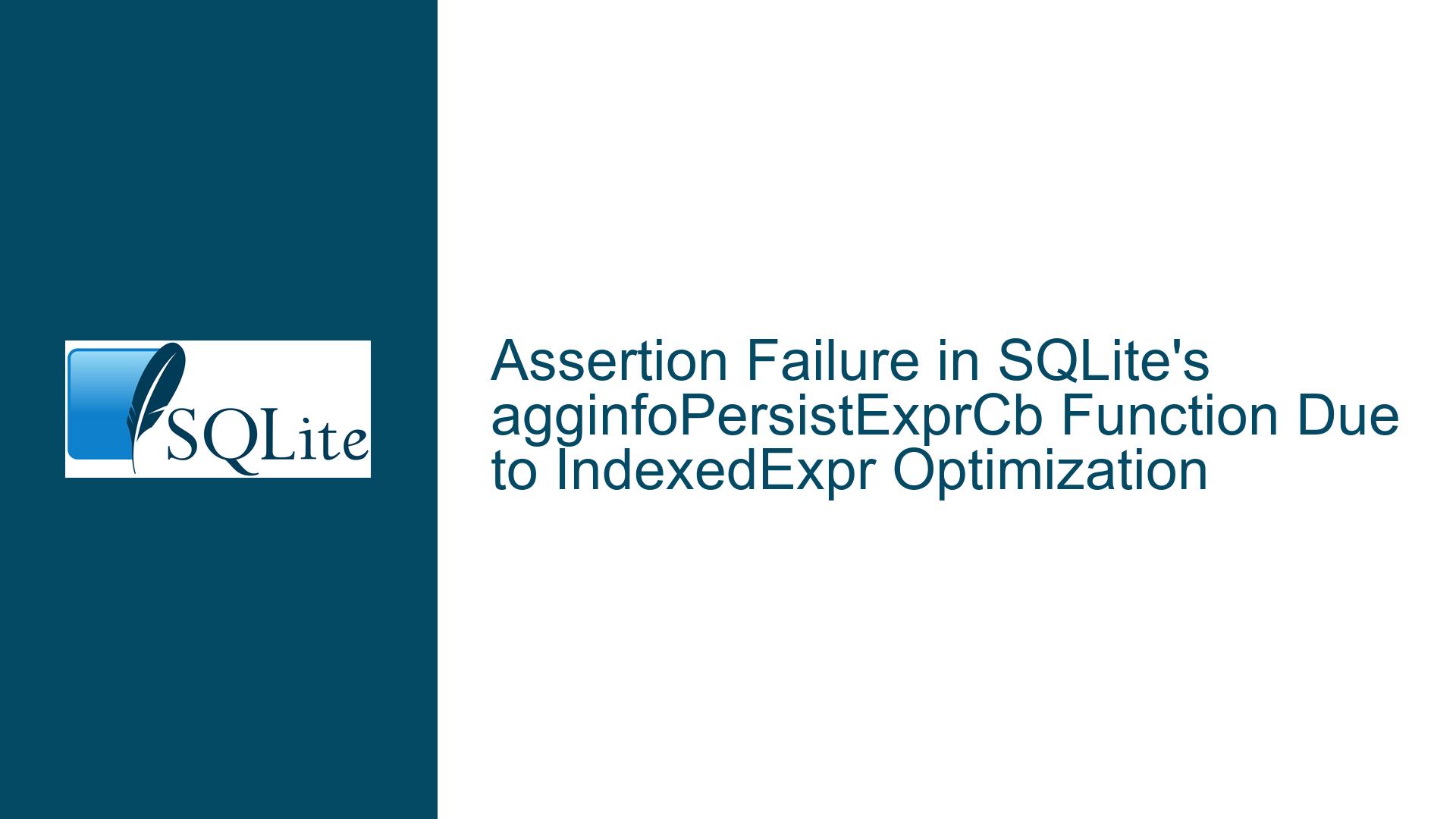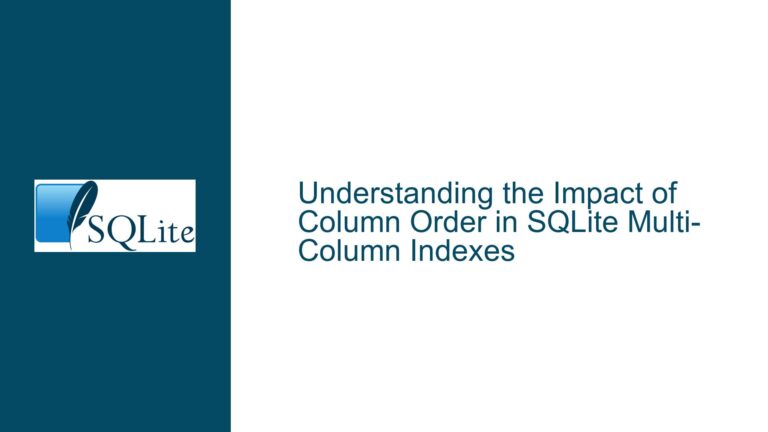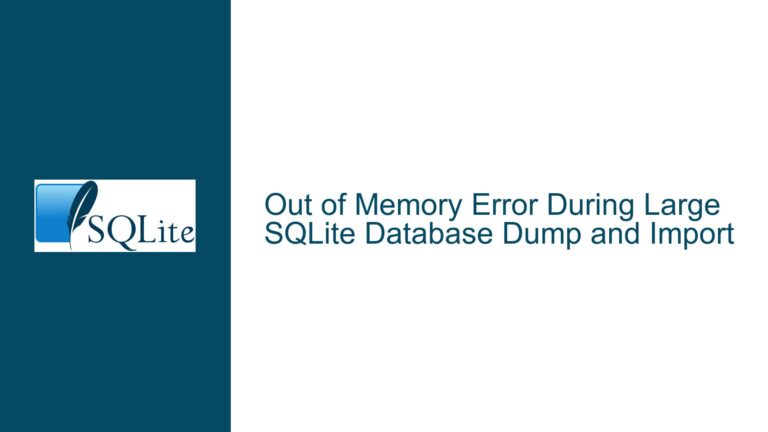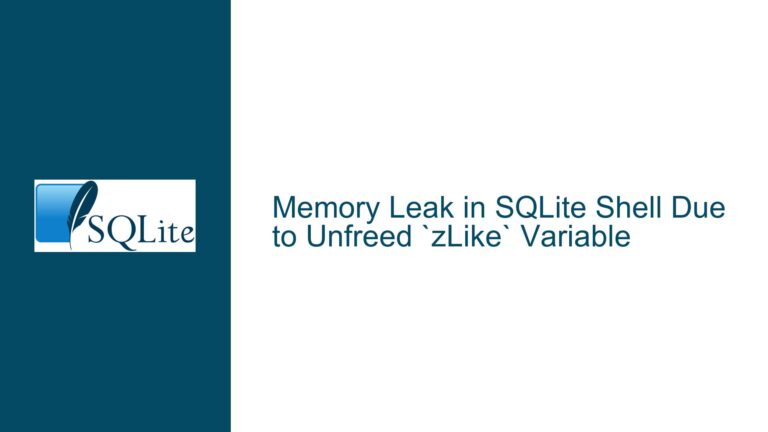Assertion Failure in SQLite’s agginfoPersistExprCb Function Due to IndexedExpr Optimization
Issue Overview: Assertion Failure in agginfoPersistExprCb Function During Query Execution
The core issue revolves around an assertion failure in the agginfoPersistExprCb function within SQLite, specifically triggered during the execution of a complex query involving window functions, subqueries, and indexed expressions. The assertion failure occurs when SQLite attempts to process an aggregate expression within a window function, combined with a partitioned-by clause and a conditional expression. The error manifests as a crash with the following assertion message: Assertion 'iAgg>=0 && iAgg<pAggInfo->nColumn' failed.
The query in question involves creating a table v0 with a single column c1, followed by the creation of an index i on v0 that includes both the column c1 and a conditional expression c1=1. The problematic query is a SELECT statement that includes a nested subquery with a window function (sum(0) OVER(PARTITION BY(c1), (a1.c1=1))), which is further wrapped in a count aggregate function. The query also includes a GROUP BY clause using the hex(0) function, adding another layer of complexity.
The assertion failure is directly tied to the SQLITE_IndexedExpr optimization, which is designed to improve query performance by optimizing indexed expressions. When this optimization is enabled, SQLite crashes due to the assertion failure. However, disabling the SQLITE_IndexedExpr optimization (via .testctrl optimizations 0x01000000) allows the query to execute without issues, indicating that the optimization is the root cause of the problem.
The issue was identified through a bisecting process, which pinpointed the problematic commit range between b9190d3da70c4171 (BAD) and 1ad41840c5e0fa70 (GOOD). The bug was later fixed in commit c34fd9fe1b76e0a5, which resolved the assertion failure by addressing the underlying logic in the agginfoPersistExprCb function.
Possible Causes: Misalignment Between Aggregate Expression Indexing and Window Function Processing
The assertion failure in the agginfoPersistExprCb function suggests a misalignment between the indexing of aggregate expressions and the processing of window functions. The agginfoPersistExprCb function is responsible for persisting aggregate expressions during query execution, ensuring that they are correctly indexed and referenced within the pAggInfo structure. The assertion iAgg>=0 && iAgg<pAggInfo->nColumn ensures that the index iAgg is within the valid range of aggregate expressions stored in pAggInfo.
The root cause of the issue lies in the interaction between the SQLITE_IndexedExpr optimization and the processing of window functions. When the optimization is enabled, SQLite attempts to optimize indexed expressions, including those used in window functions. However, the optimization logic fails to correctly account for the nested structure of the query, leading to an invalid index iAgg being passed to the agginfoPersistExprCb function. This results in the assertion failure when iAgg is either negative or exceeds the number of columns in pAggInfo.
The complexity of the query exacerbates the issue. The use of a window function (sum(0) OVER(PARTITION BY(c1), (a1.c1=1))) within a nested subquery, combined with a GROUP BY clause and a conditional expression, creates a scenario where the SQLITE_IndexedExpr optimization incorrectly handles the indexing of aggregate expressions. The optimization logic likely assumes a simpler query structure and fails to properly handle the nested and partitioned nature of the window function.
Additionally, the use of the hex(0) function in the GROUP BY clause introduces another layer of complexity. The hex function is not a standard aggregate function, and its inclusion in the GROUP BY clause may further confuse the optimization logic, leading to incorrect indexing of aggregate expressions.
Troubleshooting Steps, Solutions & Fixes: Addressing the Assertion Failure in agginfoPersistExprCb
To address the assertion failure in the agginfoPersistExprCb function, several troubleshooting steps and solutions can be applied. These steps range from temporary workarounds to permanent fixes, depending on the specific requirements and constraints of the environment.
Step 1: Disable SQLITE_IndexedExpr Optimization (Temporary Workaround)
The most immediate solution is to disable the SQLITE_IndexedExpr optimization using the .testctrl optimizations 0x01000000 command. This workaround allows the query to execute without triggering the assertion failure. However, this approach is not ideal for production environments, as it disables a performance optimization that may be beneficial for other queries. The command should be executed before running the problematic query, as shown below:
.testctrl optimizations 0x01000000;
SELECT 0 FROM v0 AS a1 WHERE (SELECT count((SELECT(sum(0) OVER(PARTITION BY(c1), (a1.c1=1) )))) FROM v0 GROUP BY hex(0)) AND a1.c1=0;
Step 2: Update SQLite to a Fixed Version (Permanent Fix)
The bug was fixed in commit c34fd9fe1b76e0a5, which addresses the underlying issue in the agginfoPersistExprCb function. Updating SQLite to a version that includes this commit (or later) is the recommended permanent fix. This ensures that the SQLITE_IndexedExpr optimization works correctly with complex queries involving window functions and nested subqueries. To update SQLite, download the latest source code from the official SQLite website and compile it with the appropriate flags:
wget https://www.sqlite.org/src/tarball/sqlite.tar.gz
tar xzf sqlite.tar.gz
cd sqlite
export CFLAGS="-g -O0 -DSQLITE_DEBUG -DSQLITE_ENABLE_TREETRACE -DSQLITE_ENABLE_WHERETRACE -DSQLITE_ENABLE_CURSOR_HINTS -DSQLITE_COUNTOFVIEW_OPTIMIZATION -DSQLITE_ENABLE_STAT4"
./configure
make
sudo make install
Step 3: Simplify the Query (Alternative Workaround)
If updating SQLite is not feasible, consider simplifying the query to avoid triggering the assertion failure. This may involve breaking down the query into smaller, less complex components or avoiding the use of window functions and nested subqueries. For example, the problematic query can be rewritten to remove the window function and replace it with a standard aggregate function:
SELECT 0 FROM v0 AS a1 WHERE (SELECT count(0) FROM v0 GROUP BY hex(0)) AND a1.c1=0;
While this approach may not produce the exact same results, it can serve as a temporary workaround until a permanent fix is applied.
Step 4: Analyze and Modify Schema Design (Preventive Measure)
In some cases, the schema design may contribute to the complexity of the query. Reviewing and modifying the schema to reduce the need for complex queries can help prevent similar issues in the future. For example, consider whether the index i on v0 is necessary or whether it can be simplified. Additionally, evaluate whether the use of conditional expressions in indexes is required or whether they can be replaced with standard columns.
Step 5: Enable Debugging and Tracing (Diagnostic Tool)
Enabling debugging and tracing features in SQLite can provide additional insights into the issue. The compilation flags used in the original post (-DSQLITE_DEBUG, -DSQLITE_ENABLE_TREETRACE, -DSQLITE_ENABLE_WHERETRACE) enable detailed tracing of query execution and optimization steps. These traces can help identify the exact point at which the assertion failure occurs and provide clues for further troubleshooting. To enable tracing, compile SQLite with the appropriate flags and run the query with tracing enabled:
export CFLAGS="-g -O0 -DSQLITE_DEBUG -DSQLITE_ENABLE_TREETRACE -DSQLITE_ENABLE_WHERETRACE -DSQLITE_ENABLE_CURSOR_HINTS -DSQLITE_COUNTOFVIEW_OPTIMIZATION -DSQLITE_ENABLE_STAT4"
./configure
make
sudo make install
sqlite3
.trace on
SELECT 0 FROM v0 AS a1 WHERE (SELECT count((SELECT(sum(0) OVER(PARTITION BY(c1), (a1.c1=1) )))) FROM v0 GROUP BY hex(0)) AND a1.c1=0;
By following these troubleshooting steps and solutions, the assertion failure in the agginfoPersistExprCb function can be effectively addressed, ensuring stable and reliable query execution in SQLite.






